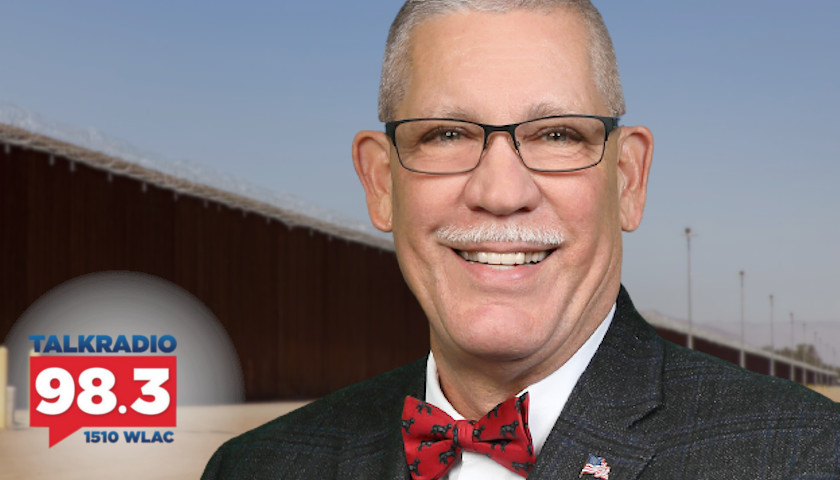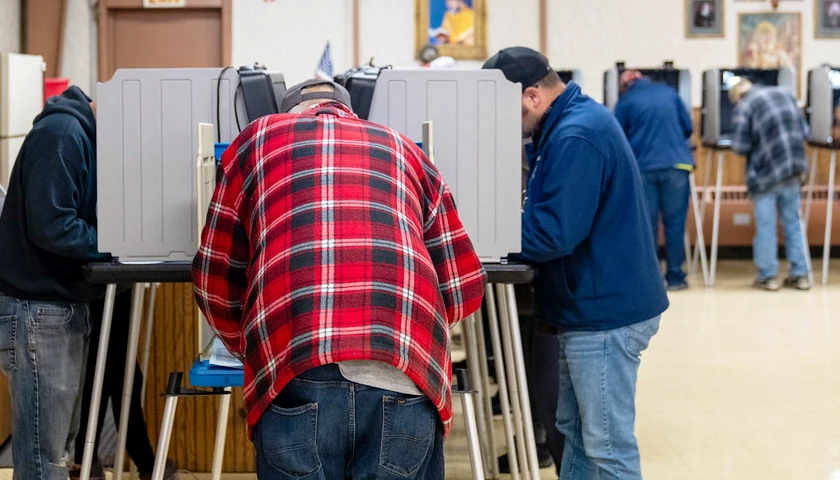Live from Washington, D.C.’s FAIR event Wednesday morning on The Tennessee Star Report with Michael Patrick Leahy – broadcast on Nashville’s Talk Radio 98.3 and 1510 WLAC weekdays from 5:00 a.m. to 8:00 a.m. – host Leahy welcomed North Carolina’s Rockingham County’s sheriff Samuel Page to the microphone to discuss Mexican cartels, the drugs coming from the southern border, and its effect on his community.
Leahy: We welcome to our microphones, Sheriff Samuel Page. You are the sheriff of Rockingham County.
Page: That’s correct.
Leahy: Tell us, is there any immigration crisis going on in Rockingham County? And where, by the way, is Rockingham County?
Page: Rockingham County is located about 25 miles north of Greensboro, North Carolina. I didn’t tell you I was a border sheriff with Virginia. (Leahy laughs) We’re about 25 miles north of Danville, Virginia, right on the border.
Leahy: I know exactly where that is. So you are a border sheriff. You’re bordering North Carolina.
Page: And Virginia.
Leahy: And Virginia. Well, good luck with that.
Page: But it’s a wonderful place to be. The problem is a lot of people don’t understand that there is a direct connection with the brother border with Mexico and just a couple of days traveling time, whether it’s human trafficking or human smuggling or the movement of the illegal drugs which are taking lives in my county regularly.
And the overdoses last year, we lost, I think 28 people due to heroin and fentanyl overdoses. And we had probably 400 plus overdose calls where we thank goodness we had Narcan.
Leahy: Narcan. Tell us about Narcan.
Page: Narcan is a drug that counters the opioid effects where a person is overdosing and dying due to those effects. I can bring a lot of people back, depending on how quickly you get to them.
All my deputies are equipped with our Narcan, a lot of our first responder’s firefighters. But I always wonder what happens if we run out of Narcan. What happens if we see a reduction in the production of Narcan?
Leahy: Is that a possibility?
Page: Well, I didn’t think he was going to have a problem with toilet paperback during COVID and all that.
Leahy: But there you go. We last interviewed you here two years ago when Donald Trump was president of the United States.
Now in January, and this is my words, not yours, the legal but not legitimate current occupant of 1600 Pennsylvania Avenue. Joe Biden is running the show. Is it better or worse under Biden?
Page: It is worse. In just nine months, the President vice President and the Secretary of Homeland Security have failed in their duties.
Leahy: Well, yeah.
Page: And it’s directly affecting us across this country,
Leahy: In which ways did they most fail in their duties?
Page: Well, the first obligation of government is to protect the people. And it starts at our borders. Homeland Security starts at home. And when you have persons that are in a Mexican drug cartel that is controlling of the southern border just below the United States territorial line there, and they’re involved in as I understand about a $52 billion a year business moving the drugs and then you add on the illegals.
A lot of this is the person that recipient of the monies are your cartels because they control who comes and goes through the border.
Leahy: Has the Biden administration’s lack of policies financially benefited the Mexican cartels?
Page: I think it contributes to their coffers. And the thing is if we don’t adhere to the policies the working policies of President Trump during his administration, the Remain in Mexico, the third country asylum issues, stuff like this, and the Title 42 type work where you restrict person do to COVID concerns.
If we don’t secure our borders and if we don’t enforce the immigration laws on the books, we’re going to continue to be in a worse shape. 15,000 people or more. I’ve heard up 260 last night that came in from Haiti.
Leahy: From what I’ve read, their Haitians who’ve been living for years in Brazil and in Central America. Not in any danger, not in any refugee status, and in fact, virtually all of them, according to a report I read at Just the News, John Solomon’s group, they had jobs. They were not under any threat in Central and South America.
Page: The reason I understand why a lot of persons from Haiti, we’re in Brazil and some other countries in South America and maybe Central America were due to the earthquake that occurred over there.
We’ve done this before with some other countries where we allow people to stay so many years during the process because they were put out of their homes.
But instead of going back to Haiti, the person through illegal migration processes hasn’t been allowed to come up through different countries. And last time I checked, if you’re seeking asylum, that should be the first country you go to not pick and choose your asylum country.
Leahy: They want to come to the United States because there’s a magnet place in the United States by Alejandro Mayorkas and Joe Biden. They’re going to come in, they’re going to get free stuff and you’re going to pay for it.
Page: Well, you said it. You said it. Can I jump to something?
Leahy: You can jump to whatever you want.
Page: I hear there’s a $3.5 trillion dollar bill, and I would just ask everybody.
Leahy: Being considered to be passed literally a couple of blocks away from where we are seated at the moment.
Page: Well, my understanding is the reconciliation bill, which is basically bypassing the Republicans in the process, not having a bipartisan process, which I thought Congress was supposed to be both sides working together. We’re trying to come to some midpoint.
Leahy: Nancy Pelosi did not get that memo. (Laughs)
Page: She did not. But see, a lot of people don’t realize that. My understanding is that would allow for probably eight million persons that are illegal to be able to gain status over a 10 year period.
Leahy: They’re slipping all that in and the Biden administration is saying we’re going to stop all these changes and going to give citizenship to all these illegals. That’s what they’re trying to do.
Page: Well, what’s the cost? I understand in, yes, $140 billion dollars. Now, that may sound like a lot of money. I can’t count how many zeros it is. That’s a lot of money. And then I start hearing the trillions and stuff like that.
And it goes back to one of my thoughts is we need to hold not only as we hold our local and state representatives and our local officials accountable, but we need to hold from the present down all officials also and in our Congress.
Senator Cruz spoke last night, and I was listening to him and we have some senators and some contenders speaking out on the issues right now on the border security issues. But when are we going to have other senators? When are we going to have other senators come up?
Leahy: That is the question of the hour.
– – –
Tune in weekdays from 5:00 – 8:00 a.m. to the Tennessee Star Report with Michael Patrick Leahy on Talk Radio 98.3 FM WLAC 1510. Listen online at iHeart Radio.





